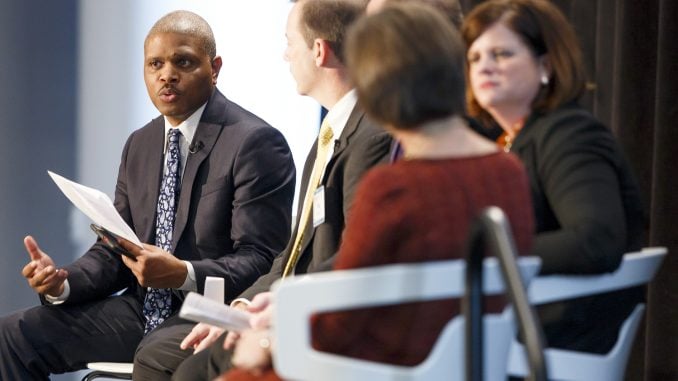
RALEIGH Investing in early childhood has become a focus for many communities across North Carolina. Organizations based on faith or community service, partnerships serving children, corporate industries and even the local chamber of commerce in cities around North Carolina are banding together in support.”We look to high schools and community colleges for our workforce planning, but talent preparation begins early, even as young as kindergarten, and we are already losing that talent,” said Donnie Charleston, economic policy manager for the Institute of Emerging Issues. “If we are planning to meet the goal of having 65 percent of all jobs by 2020 in North Carolina having a post-secondary degree, then we need to start early having children follow a crib-to-career pipeline,” Charleston and the Institute for Emerging Issues at NC State University presented its 2017 Focus Forum on Tuesday centered around “The Economics of Early Childhood Investment.”Rural communities in North Carolina feel the effects of child poverty differently for more populated and financially prosperous regions of the state.”Rural communities do not have the big, private funders as the large urban communities do,” said Page Lemel, vice chair of the Transylvania County Board of Commissioners. “When industries leave, we are losing more than jobs. We are losing the sponsorship of community activities, athletic teams and programs. These donors are propping up the entities that provide programs of early childhood investment.”Rural communities struggle to bring together enough money to make the impact being discussed in those larger areas around the state,” she added. “Our counties are (financially) strapped. We are looking to the state for leadership and support.”Faith-based organizations are one area that is working to provide assistance to children in low-income families.”Though faith-based organizations are often overlooked, the faith-based communities are leveraging these community issues by having churches partner with public schools,” said Pat Litzinger, assistant district superintendent, Harbor District, of the North Carolina Conference of United Methodist Church.”Faith-based communities should be included in the dialogue among communities for dealing with these issues as many churches are providing daycare and preschool options across the state,” said Litzinger.Different church denominations, such as the United Methodists, offer outreach organizations to support the mission of helping communities in need.The Congregations for Children, an outreach organization of the North Carolina Conference of the North Carolina United Methodist Church, is one such entity. Congregations for Children offers three main principles: partnering churches with public schools to assist with K-3 literacy by providing tutors and library books; helping to meet the basic needs of children in the community by providing backpacks of food and school supplies as well as clothing; and assisting with encouraging parental involvement.”We are continuously working to support and raise awareness of the child poverty issue,” said Litzinger.”Children and babies don’t choose who gives birth to them. We all have to take an interest, invent and work to provide citizens with quality and respectable child care options so parents can be productive employees,” said Lemel.



